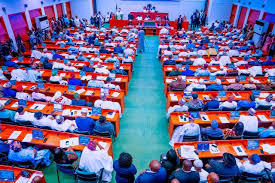By Adeyemi Adekunle
The Nigerian Senate approved President Bola Tinubu’s request for a $2.2 billion loan on Thursday, marking a significant step in the administration’s fiscal strategy for the 2024 fiscal year. The approval came after a detailed report presented by the Chairman of the Senate Committee on Local and Foreign Debts, Senator Aliyu Wamakko, underscoring the urgency and importance of the financial request.
The nation’s budget deficit has reached an alarming ₦9.7 trillion, prompting the government to seek comprehensive measures to ensure economic stability and sustain critical services. During the Senate plenary, Deputy Senate President Jibrin Barau expressed appreciation for the committee’s swift and thorough evaluation of the loan request. “This approval reflects our commitment to fiscal responsibility and economic recovery,” Barau stated, highlighting the importance of timely legislative action in addressing Nigeria’s financial challenges.
President Tinubu’s letter to the National Assembly articulated the loan’s integral role in his administration’s fiscal strategy. The letter, which was read during the plenaries of both the Senate and House of Representatives on Tuesday, outlined the necessity of the loan to fund essential programs and projects, emphasizing that without this financial support, the government would struggle to meet its obligations in the upcoming fiscal year.
Senate President Godswill Akpabio confirmed that the loan had already been factored into the external borrowing plan for 2024. He had previously urged the Senate Committee on Local and Foreign Debts to expedite the review process. “It is imperative that we act swiftly to secure the funds necessary to stabilize our economy and support our development initiatives,” Akpabio remarked during the session.
The approval of the loan aligns with the government’s broader strategy to enhance infrastructure development, improve public services, and stimulate economic growth, particularly in light of ongoing economic challenges. As global economic instability continues to impact Nigeria, the government is focused on securing favorable borrowing terms to optimize the use of external funds while minimizing the financial strain on its citizens.
Experts have raised concerns about the implications of accruing additional debt, stressing the need for prudent financial management and transparency in the use of borrowed funds. “While this loan is necessary, it is crucial that the government demonstrates accountability and effectively manages the resources to ensure they benefit the populace,” said Dr. Niazi Sulaiman, an economist at a leading Nigerian university.
The approval has received mixed reactions from various stakeholders in the country. While some applaud the government’s proactive approach to address the budget deficit, others caution against the potential risks associated with increased national debt. Civil society organizations have called for clearer communication from the government regarding how the borrowed funds will be allocated and monitored.
As the Senate’s decision sets the stage for the government to secure the necessary funds, the focus now shifts to implementation and ensuring that projects funded by the loan contribute meaningfully to national development. Public anticipation is high as citizens await details on how the loan will impact their lives, particularly in sectors such as education, healthcare, and infrastructure.
In the coming days, the government is expected to outline its plans for utilizing the loan effectively while addressing the concerns raised by various stakeholders. With this loan approval, President Tinubu’s administration aims to reinforce its commitment to fiscal discipline and economic recovery amid pressing financial constraints.
As Nigeria navigates its economic landscape, the successful management of this loan will play a pivotal role in shaping the nation’s financial health and development trajectory in the years to come. The passage of the loan not only reflects urgent economic realities but also the Senate’s resolve to support measures that foster national growth and stability. Further details about the loan’s implementation and oversight are anticipated in the near future as the government seeks to reassure citizens of its dedication to transparency and fiscal prudence.




